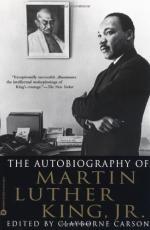
|
| Name: _________________________ | Period: ___________________ |
This test consists of 15 multiple choice questions and 5 short answer questions.
Multiple Choice Questions
1. Who was the Governor of Arkansas when federal troops were called in to protect students at Central High School in Little Rock?
(a) Orval Tessier.
(b) Orval Faubus.
(c) Dobie Gillis.
(d) George Wallace.
2. Where was Martin Luther King, Jr., born?
(a) Atlanta.
(b) Montgomery.
(c) Birmingham.
(d) Selma.
3. After being convicted for failing to obey a police officer, who paid King's fine on 4 September 1958?
(a) Montgomery's Police Commissioner.
(b) The SCLC.
(c) The National Association for the Advancement of Colored People (NAACP).
(d) The police officer he disobeyed.
4. When did King and other MIA leaders unsuccessfully meet with whites in an attempt to resolve the bus issue?
(a) 22 December 1955.
(b) 17 December 1955.
(c) 12 December 1955.
(d) 5 December 1955.
5. City and bus officials felt the bus protest would pass quickly once what happened?
(a) Protestors grew weary of walking.
(b) Initial interest diminished.
(c) The first rainy day arrived.
(d) Volunteers tired of transporting.
6. King believed preaching should come from the people's experiences, and specified that he must know what about those he pastored?
(a) Their fortuity.
(b) Their status.
(c) Their faith.
(d) Their problems.
7. When did King and other civil rights leaders meet with Eisenhower?
(a) 23 June 1958.
(b) 23 August 1958.
(c) 23 August 1957.
(d) 23 June 1957.
8. King viewed preaching as the dual process of what?
(a) Changing individuals' social status, the environment.
(b) Changing individuals' faith, societies.
(c) Changing individuals' religious views, societies.
(d) Changing individuals' souls, societies.
9. After having read Karl Marx to understand Communism's appeal to so many, what had King concluded about his views?
(a) He rejected Marx' materialistic views of history, ethical relativism.
(b) He accepted Marx' materialistic views of history, ethical relativism.
(c) He accepted Marx' political views of totalitarianism, secularism.
(d) He rejected Marx' political views of totalitarianism, poverty.
10. King stipulated there was something in the universe that justified Cullen Bryant when he said what?
(a) "Truth crushed to earth, will rise again."
(b) "Truth remains firm, not flexible to wishes."
(c) "Truth will forever be on the scaffold."
(d) "Society hinges on truth, without which it suffers greatly."
11. How was King informed that he had been unanimously called to the pastorate of Dexter Avenue Baptist Church?
(a) Air-mail, special-delivery letter.
(b) First-class mail.
(c) Telephone call.
(d) Telegram.
12. King was arrested and jailed on what date for speeding during the "Get Tough" campaign?
(a) 16 January 1956.
(b) 31 January 1956.
(c) 21 January 1956.
(d) 26 January 1956.
13. How did King respond to President Eisenhower's use of force when integrating Central High School in Little Rock, Arkansas?
(a) He withheld comment regarding Eisenhower's acton.
(b) He spoke for and against Eisenhower's action.
(c) He applauded Eisenhower's action.
(d) He denounced Eisenhower's action.
14. King described which individual as his "closest associate and most trusted friend" from the start of the boycott?
(a) Ralph Abernathy.
(b) Jack Crenshaw.
(c) E.D. Nixon.
(d) Roy Bennett.
15. What primary dilemma did King and Coretta face when accepting the offer of Dexter Avenue Baptist Church rather than others in the North?
(a) Segregation in the South.
(b) Opportunities in the North.
(c) Freedoms in the North.
(d) Salaries in the South.
Short Answer Questions
1. Why was Coretta unable to travel frequently with King?
2. What did King note came out in the New York Times about his injury?
3. King described his mother as having been what?
4. What were among the false rumors spread about King?
5. On what date did King's attorney arrange his release from prison?
|
This section contains 597 words (approx. 2 pages at 300 words per page) |

|




